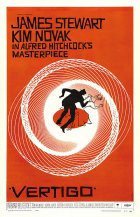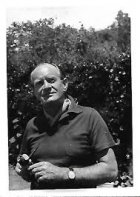
Vertigo Page #13
- PG
- Year:
- 1958
- 128 min
- 4,204 Views
MADELEINE:
And promise you won't ask me again.
Please promise me that.
He looks down at her somberly, promising and refusing nothing.
They start walking, holding together, and the two figures
become small in the distance, moving away through the tall
trees.
DISSOLVE TO:
EXT. CYPRESS POINT OR POINT LOBOS - (DAY) SAME DAY.
Below the point of land, the sea pounds against the rocks.
Madeleine stands alone, silhouetted against the sky. Scottie
sits in the car, watching her. She does not move. Then slowly
she starts to walk toward the sea, and as he watches he
senses, without being sure, that her pace is increasing, and
suddenly he opens the car door and jumps out and slams the
door and begins to run. But then he sees something, and slows
down quickly and walks, for Madeleine has stopped and turned
and is waiting for him. There is a gentle, apologetic smile
in her eyes. She waits, and he comes to a stop before her.
MADELEINE:
Why did you run?
He looks down at her searchingly.
SCOTTIE:
(Finally, quietly)
I'm responsible for you now, you
know. The Chinese say that once you
have saved someone's life, you are
responsible for it forever. And so
I'm committed. And I have to know.
MADELEINE:
And you'll go on saving me? Again
and again?
He waits. She looks down.
MADELEINE:
There is so little I know. It is as
though I were walking down a long
corridor that once was mirrored, and
fragments of mirror still hang there,
dark and shadowy, reflecting a dark
image of me... and yet not me...
someone else, in other clothes, of
another time, doing things I have
never done... but still me... And I
can't stop to ask why, I must keep
on walking. At the and of the corridor
there is nothing but darkness, and I
know when I walk into the darkness,
I'll die.
(Pause; she looks up)
But I've never come to the and; I've
always come back, before then. Except
once.
SCOTTIE:
Yesterday.
She nods.
SCOTTIE:
And you didn't know. You didn't know
what happened. Until you found
yourself there with me.
She shakes her head.
SCOTTIE:
You don't know where you were.
She shakes her head.
SCOTTIE:
But the small scenes, the fragments
in the mirror:
you remember them.MADELEINE:
Vaguely...
SCOTTIE:
What do you remember?
MADELEINE:
(Searching)
A room... there is a room, and I sit
there alone... always alone...
SCOTTIE:
Would you know the room?
MADELEINE:
No... it's in shadow.
SCOTTIE:
What else?
MADELEINE:
A grave...
SCOTTIE:
Where?
MADELEINE:
I don't know. An open grave. I stand
by the gravestone looking down into
it. And it's my grave.
SCOTTIE:
How do you know?
MADELEINE:
I know.
SCOTTIE:
There's a name on the gravestone.
MADELEINE:
No. It's new and clean, and waiting.
SCOTTIE:
(Beginning to feel
lost)
What else?
MADELEINE:
(Searching)
This part is dream, I think. There
is a tower and a bell and... a garden
below... but it seems to be in
Spain... a village in Spain. And
then it clicks off, and is gone.
SCOTTIE:
A portrait? Do you ever see a
portrait?
MADELEINE:
No.
SCOTTIE:
Of the woman in the mirror. Would
you know her if you saw her?
MADELEINE:
But I'm the woman in the mirror!
SCOTTIE:
(Desperately)
No!
She looks up at him, rebuffed, desperately lost, and her
eyes well with tears. Scottie is looking away, lost in
thought.
SCOTTIE:
(To himself)
If I could find the key... find the
beginning put it together...
MADELEINE:
(Quietly, lost)
And so explain it away? But there
is a way to explain it, you see. If
I'm mad? That would explain it,
wouldn't it?
Scottie looks at her, and her eyes are big with fright and
despair and a plea for denial, and suddenly she breaks, and
the tears flow, and she turns her head away sharply and turns
and runs toward the edge of the land.
SCOTTIE:
Madeleine!!
He races after her and catches her and holds her, and she is
against him, clinging tightly, deep in his embrace, and
sobbing fiercely.
MADELEINE:
(Muffled, against his
breast)
I'm not mad. I'm not mad. And I don't
want to die, but there's someone
inside me, there's a somebody else,
and she says I must die... Scottie,
don't let me go!
SCOTTIE:
I'm here, I've got you...
MADELEINE:
I'm so afraid...
(She looks up)
...you won't let it happen...
Her face is close to his and they are clinging tightly
together. He shakes his head, and then suddenly his mouth is
on hers, and they are deep in a kiss. Their lips part, but
remain close together.
MADELEINE:
(Whispering)
Don't leave me... stay with me...
SCOTTIE:
All the time.
They kiss again, passionately. And the wind blows and the
waves dash against the rocks, throwing up a curtain of spray.
DISSOLVE TO:
INT. MIDGE'S APARTMENT - (NIGHT)
Outside the terrace darkness is falling, and the lights of
the city have come on. In Midge's apartment the lights are
on and soft music comes from the radio (possibly "progressive
jazz" of the gentle George Shearing kind). Midge is painting
at a standing easel; She has a palette; obviously she is
painting in oils. We cannot see what she is painting; the
canvas on stretchers has its back to us. Its size is about
thirty by forty inches. Whatever it is, it seems to please
her:
she pauses in her work, picks up a highball from a tablenearby, drinks and stares at the painting and giggles a little
to herself than applies a few more daubs. Now she hears the
outside gate slam. She puts down the brush and the drink,
moves the easel a bit so that the canvas cannot be seen from
the front door, picks up a water tumbler that contains a
small nosegay, and hurries out to the kitchen with it. The
door to the apartment slams.
SCOTTIE:
(Calling)
Midge?
Midge hurries out of the kitchen.
MIDGE:
Hi, Johnny! Did you get my message?
She immediately goes to the small sideboard or table on which
are bottles, glasses, and ice, and mixes him a highball.
Scottie is at ease. He drops his hat on a chair near the
door and wanders into the room.
SCOTTIE:
I did. Since when do you go about
slipping notes under men's doors?
MIDGE:
Since I stopped being able to get
them on the phone. For a man who has
nothing to do, you're certainly a
busy little bee. Where do you go,
these days?
SCOTTIE:
Just wander.
MIDGE:
Where?
SCOTTIE:
Around.
MIDGE:
Oh?
She hands him the drink. He takes a long pull at it as she
watches him.
SCOTTIE:
Mm. Better.
MIDGE:
Did you need it?
SCOTTIE:
Yeah.
MIDGE:
Oh?
She crosses the room to get her own drink, giving a flick of
a glance at the canvas as she goes. Scottie watches her,
slightly amused, knowing that her curiosity is working like
mad.
SCOTTIE:
What was this desperate urge to see
me?
MIDGE:
All I said in the note was: "Where
are you?" That doesn't sound desperate
to me.
SCOTTIE:
Well, I detected an undercurrent.
MIDGE:
I just thought if I gave you a drink
and fed you some dinner, you'd be so
grateful you'd take me to a movie.
SCOTTIE:
Fair enough. What'll we talk about
at dinner?
MIDGE:
Oh... this and that.
Translation
Translate and read this script in other languages:
Select another language:
- - Select -
- 简体中文 (Chinese - Simplified)
- 繁體中文 (Chinese - Traditional)
- Español (Spanish)
- Esperanto (Esperanto)
- 日本語 (Japanese)
- Português (Portuguese)
- Deutsch (German)
- العربية (Arabic)
- Français (French)
- Русский (Russian)
- ಕನ್ನಡ (Kannada)
- 한국어 (Korean)
- עברית (Hebrew)
- Gaeilge (Irish)
- Українська (Ukrainian)
- اردو (Urdu)
- Magyar (Hungarian)
- मानक हिन्दी (Hindi)
- Indonesia (Indonesian)
- Italiano (Italian)
- தமிழ் (Tamil)
- Türkçe (Turkish)
- తెలుగు (Telugu)
- ภาษาไทย (Thai)
- Tiếng Việt (Vietnamese)
- Čeština (Czech)
- Polski (Polish)
- Bahasa Indonesia (Indonesian)
- Românește (Romanian)
- Nederlands (Dutch)
- Ελληνικά (Greek)
- Latinum (Latin)
- Svenska (Swedish)
- Dansk (Danish)
- Suomi (Finnish)
- فارسی (Persian)
- ייִדיש (Yiddish)
- հայերեն (Armenian)
- Norsk (Norwegian)
- English (English)
Citation
Use the citation below to add this screenplay to your bibliography:
Style:MLAChicagoAPA
"Vertigo" Scripts.com. STANDS4 LLC, 2024. Web. 25 Dec. 2024. <https://www.scripts.com/script/vertigo_1423>.



Discuss this script with the community:
Report Comment
We're doing our best to make sure our content is useful, accurate and safe.
If by any chance you spot an inappropriate comment while navigating through our website please use this form to let us know, and we'll take care of it shortly.
Attachment
You need to be logged in to favorite.
Log In